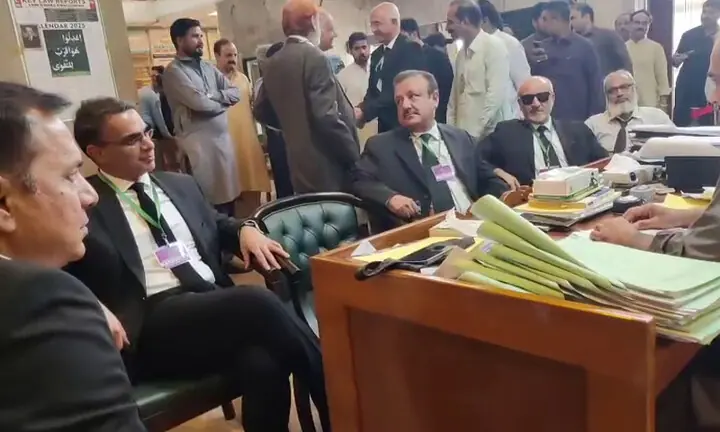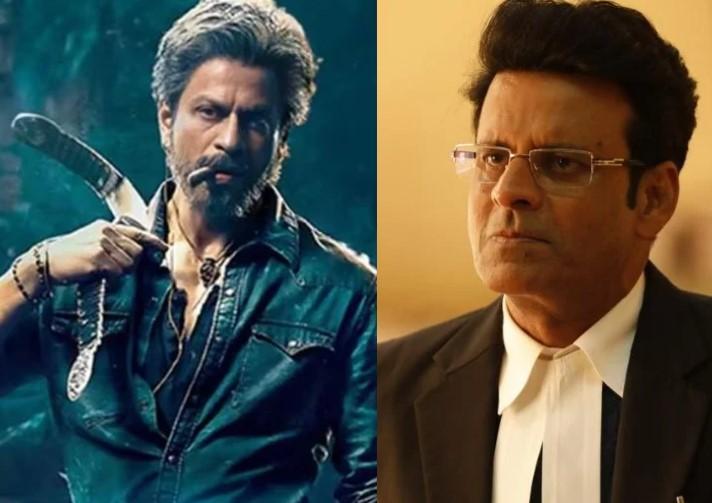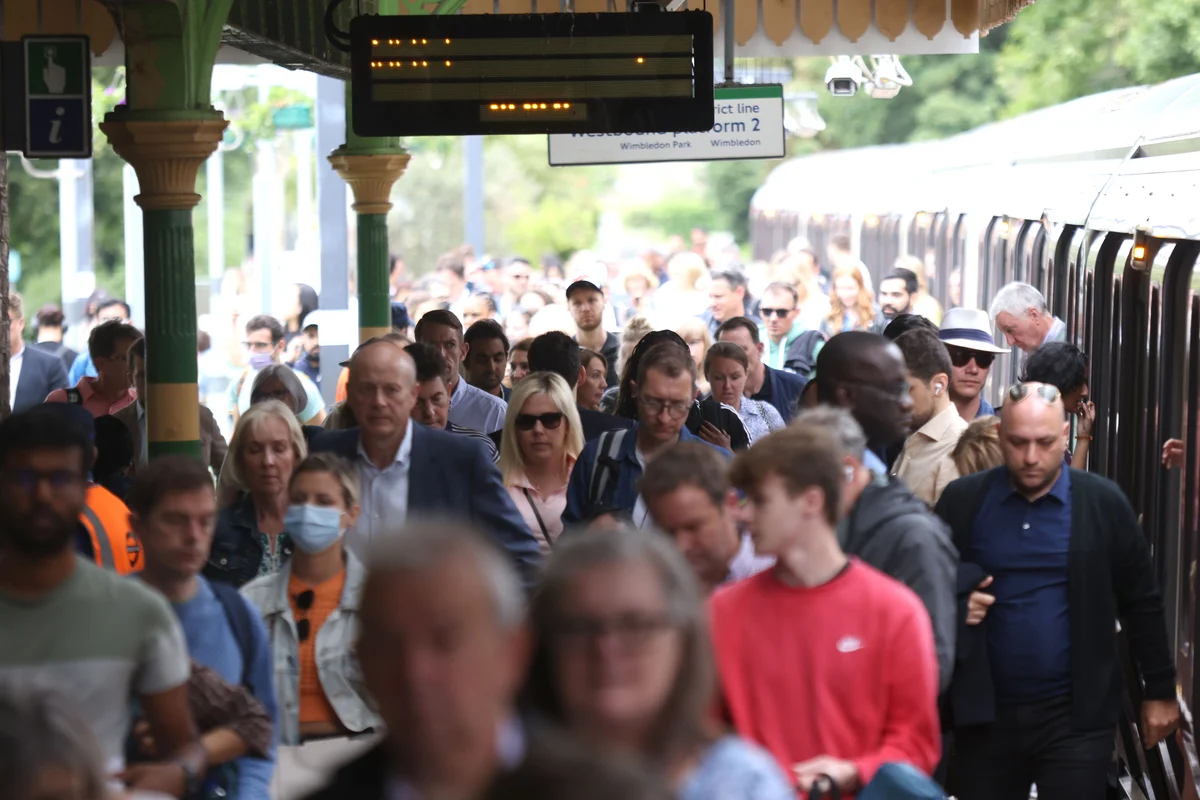By Umer Mehtab
Copyright dawn

Five Islamabad High Court (IHC) judges — namely Justices Mohsin Akhtar Kayani, Babar Sattar, Tariq Mah-mood Jahangiri, Saman Riffat Imtiaz and Ejaz Ishaq — submitted separate petitions at the Supreme Court (SC) together on Friday against a number of issues affecting the court recently, from the composition of benches to rosters to case transfers.
The petitions, available with Dawn.com, named the IHC, IHC Chief Justice Sardar Muhammad Sarfraz Dogar and the Federation of Pakistan as respondents and were filed under Article 184(3) of the Constitution.
Article 184(3) sets out the SC’s original jurisdiction and enables it to assume jurisdiction in matters involving a question of “public importance” with reference to the “enforcement of any of the fundamental rights” of Pakistan’s citizens.
In their petitions, the judges moved the SC to declare that administrative powers could not be “deployed to undermine or trump the judicial powers” of the high court judges.
They further asked the apex court to declare that a chief justice of the high court was “not authorised to constitute benches or transfer cases” once a high court bench had been assigned a case.
Moreover, the petitions sought the declaration that the chief justice of a high court “cannot exclude available judges from the roster, at will, and use the power to issue a roster to oust judges from performing judicial functions”.
The SC was also urged to declare “that the constitution of benches, transfer of cases and issuance of roster can only be done in accordance with the rules adopted by the entirety of the High Court under Article 202 (rules of procedure), read with Article 192(1) (constitution of high court) of the Constitution”.
The petitioners also asked the apex court to declare that the “decision-making” with respect to the constitution of benches, issuance of roster and transfer of cases could not “solely rest in the hands of the chief justice”.
“Declare that the ‘Doctrine of the Master of the Roster’ has definitely been set aside in Supreme Court decisions,” the petitions read.
The petitions further sought the declaration that formation of IHC’s administration committees through notifications dated February 3 and July 15 and all the actions taken by them “suffer from mala fide in law and are illegal”. They asked the court to set aside these notifications and all actions taken by the administration committees constituted under them for “being illegal and coram non judice”.
Moreover, they stated: “Declare that the adoption and approval of Islamabad High Court Practice and Procedure Rules, 2025, by the illegally constituted administration committee, and its notification without prior approval of the high court is in breach of Article 192(1) and Article 202 of the Constitution, and its subsequent endorsement in September, are illegal and of no legal effect.”
The judges further stated in their prayers that the SC “direct the IHC to provide effective supervision and oversight” over the functioning of the district judiciary, as mandated by the Constitution under Article 203, which states that each high court shall supervise and control all courts subordinate to it.
The petitioner asked the SC to “declare that a high court cannot issue a writ under Article 199 of the Constitution to itself.” Article 199 pertains to the jurisdiction of a high court.
They continued: “A Division Bench of high court is neither vested with jurisdiction to sit in appeal over interlocutory orders of a single bench nor can assume control over the proceedings of a single bench as if it is an inferior court or tribunal.”
An interlocutory order refers to a temporary judgment passed in an ongoing case.
The petitioners requested the SC to declare that a high court judge can only be “restrained from working from performing judicial duties under Article 209 and a writ of quo warranto seeking the removal of a judge from office is not maintainable.”
Article 209 of the Constitution empowers the Supreme Judicial Council to carry out inquiries into the capacity and conduct of Supreme Court and high court judges.
The petitioners concluded their statement by asking the SC to “grant any other relief deemed appropriate in the circumstances of this case.”
Rift within IHC
Today’s development has once again highlighted deep fissures within the IHC, which gained prominence as Justice Sardar Muhammad Sarfraz Dogar was appointed as the high court’s chief justice.
The fissures in the high court can be traced back to March last year, when in a startling letter written to the Supreme Judicial Council (SJC) members, the five IHC judges, along with Justice Arbab Muhammad Tahir had accused the country’s intelligence apparatus of interference in judicial affairs, including attempts to pressure judges through abduction and torture of their relatives and secret surveillance inside their homes.
Widespread calls subsequently emerged from various quarters for a probe into the investigation, amid which former chief justice of Pakistan (CJP) Qazi Faez Isa summoned a full court meeting of the Supreme Court’s judges. After a meeting between CJP Isa and Prime Minister Shehbaz Sharif on March 28, the duo decided to form a commission to investigate the concerns of interference in judicial affairs following the cabinet’s approval. However, former CJP Tassaduq Hussain Jillani, who was appointed to head the commission, subsequently recused himself from the matter, leading to the apex court taking a suo motu notice of the issue.
In November 2024, the Supreme Judicial Council, chaired by incumbent CJP Yahya Afridi, who also heads the council, had considered different options concerning the letter and agreed to expand consultations, noting that the code of conduct of judges applies to heads of different institutions as well as judges.
Meanwhile, the 26th Constitutional Amendment was passed in October 2024, bringing many changes, most of which pertain to the judiciary.
Rumours began circulating in December 2024 that the judicial bureaucracy was reportedly planning to bring a judge from the Lahore High Court (LHC) to lead the IHC after the elevation of the then-IHC chief justice.
Traditionally, the senior puisne judge of a high court was appointed as the chief justice, but the Judicial Commission of Pakistan (JCP) had introduced new rules to bypass the seniority criterion in light of the 26th Amendment. The JCP had proposed that the chief justice of a high court could be appointed from among the panel of five senior-most judges.
In February 2025, the five IHC judges had formally opposed the then-potential transfer of then-LHC Justice Dogar, warning that his elevation as the IHC chief justice would violate constitutional procedures and judicial norms.
The letter was addressed to CJP Afridi, then-IHC CJ Aamer Farooq, LHC Chief Justice Aalia Neelum and Sindh High Court Chief Justice Mohammad Shafi Siddiqui and raised serious concerns over the possible transfer.
However, Justice Dogar, who was sworn in as a LHC judge in June 2015, was formally transferred to the IHC on February 1. His transfer, along with those of two other judges, to the IHC had also impacted its seniority list and led to many changes as Justice Kayani, who was senior puisne jud-ge before Justice Dogar’s transfer, has been removed from the top decision-making committee. Justice Kayani was also stripped of the position of inspection judge of the special courts.
The IHC administration had formally notified Jus-t-ice Dogar as the senior puisne IHC judge of the Islam-abad High Court and also revi-sed its seniority list.
The seniority list is as follows: Justice Sarfaraz Dogar, Justice Mohsin Akhtar Kayani, Justice Miangul Hassan Aurangzeb, Justice Tariq Mehmood Jahangiri, Jus-tice Babar Sattar, Justice Sardar Ejaz Ishaq Khan, Justice Arbab Muhammad Tahir, Justice Saman Rif-fat Imtiaz, Justice Khadim Hussain Soomro, Justice Mohammad Azam Khan, Justice Mohammad Asif and Justice Inaam Ameen Minhas.
The five IHC judges had then sent a representation to the IHC chief justice and CJP Afridi against placing them down on the seniority list but this was rejected.
Justice Dogar was appointed as the acting IHC chief justice on Feb 13. The next day, he took the oath in a ceremony. All IHC judges were invited, but five of them — the same ones who filed petitions in the SC today — did not attend the ceremony and boycotted it.
Following the development, the IHC went through a major administrative restructuring, which notably reduced the authority of senior puisne judge Justice Kayani — who previously held key decision-making roles — following amendments to the high court rules.
The IHC Administration Com-mittee, previously comprising the chief justice, the senior puisne judge and a senior judge, was restructured to include CJ Dogar and two of his nominees. This reconstitution significantly altered the court’s decision-making authority.
On Feb 20, the five judges had petitioned the SC to restrain Justice Dogar from carrying out his duties as the acting IHC chief justice.
In March, Justice Sattar and Justice Imtiaz had expressed concerns over the demanding of gratuity by the court staff and changes to the rules that stripped the senior puisne judge of his powers.
A subsequent consolidation of all petitions related to ex-PM Imran Khan’s jail conditions apparently widened the gulf among the IHC judges as Justice Ishaq had raised critical questions about the transfer of a case pending before his court.
The tensions simmering among the IHC judges seemingly boiled over on March 21, when three members of the IHC Tribunal — who were replaced earlier this month when the tribunal was reconstituted — declared that neither the acting chief justice nor the president had the authority to dissolve or reconstitute the tribunal without legal justification.
Around the end of March, Justice Sattar had questioned the chief justice’s authority to administratively reassign cases, emphasising that such decisions fell within the jurisdiction of judges and the deputy registrar.
More to follow



